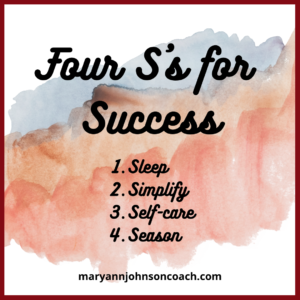 My husband was watching the show The Irrational. It’s about a behavioral science professor who solves tough police cases. I was in the kitchen and could hear it. The main character had an appendix surgery. He tried to rise from his bed a few times because there was a case he wanted to get going on. His sister had to nag at him to remain in bed and heal. At one point the professor spoke with a priest, while still in the hospital. The priest said, “St. Stillness has visited you.” Then he smiled and the professor replied, “Oh, stillness. I’m not very good at it.”
My husband was watching the show The Irrational. It’s about a behavioral science professor who solves tough police cases. I was in the kitchen and could hear it. The main character had an appendix surgery. He tried to rise from his bed a few times because there was a case he wanted to get going on. His sister had to nag at him to remain in bed and heal. At one point the professor spoke with a priest, while still in the hospital. The priest said, “St. Stillness has visited you.” Then he smiled and the professor replied, “Oh, stillness. I’m not very good at it.”
This intrigued me because one of my favorite scriptures is “Be still and know that I am God.” Psalm 46:10, from the Christian Bible. However, I, like the professor, must work to be still.
Recently, I got a call from a friend. We have both had challenging things happen in the last few years and talked about how we’ve managed. At some point in the conversation, I said, “God has put me in Rest and Rejuvenation 101 so I can learn to manage better.” She began laughing, and so did I. She knew exactly what I was talking about.
This topic of Stillness, Rest, and Rejuvenation is tied to the article I wrote on Peaceful Intensity. Not only must we manage busy and often chaotic days with a sense of peace and calmness, but we also need to learn to be still so that we find moments of rest and are rejuvenated. As we do, we manage better.
Getting things done is my nature but it isn’t healthy to think, move, and manage stuff all the time. It leads to weariness, grumpiness, and resentment even though we choose to bypass stillness, receive rest, and be rejuvenated. I have been in this class for a few years. Some tests I pass and others I fail. But I keep receiving resources and information, practicing, and growing. I’m doing what I have done dozens of times in the past seventy-five years, I’m working on getting better at a skill that will help me remain healthy and happy.
My current mission is to care for my mother, who has dementia, my husband who has several illnesses, and help my daughter care for her four children, one with severe cerebral palsy. When I stop and think about it, I realize this is not random. I had determined previously, that I needed to learn to live my favorite scripture, be still, and know God. He, being wise and loving, put me in this class by giving me this current assignment.
In the last couple of years, I have begun to see the connection between stillness and the rest it brings leading to rejuvenation. I haven’t always enjoyed the object lessons in this class. They have been trying at times. However, I have begun to pass a few more tests.
Like many of you, I have a lot on my plate. Whether those we care for are old or young it is the same work. So, learning to be still in small increments, so that we rest and rejuvenate multiple times daily, is vital to our health and well-being.
My Commitment/Affirmations for 2025 are beautiful, and when I read them, I’m astonished at how well they hit the mark. It was worth the effort I put into creating them. Some of them focus on stillness, rest, and rejuvenation because I knew going into this year that I needed to make more progress.
Here are a few things that I have in my current stillness arsenal.
•I have found a way of meditation that works for me. I have a list of meditations that take 8 minutes or less. To meditate, you must get still and focus. I listen to one most nights before I go to bed. It helps me fall asleep quickly.
•Before I begin praying, I stop and get quiet. I am still for a few minutes before I utter a word whether that prayer is being said in my nightly shower, kneeling at the side of my bed, or while washing a sink full of dishes.
•My husband says when I wake up, I move like a fireman. He’s right. Now I am making myself lie still for just a few minutes and feel the goodness of the day before I allow my feet to touch the ground.
•I’m making a diligent effort to remember to breathe deeply three or four times whenever I feel frustration, annoyance, or irritation coming into my body.
•When I must solve a problem or make a decision, I sit down and remain still for a couple of minutes to clear my mind and prepare myself.
•When I face an old story or a new negative one, rather than feeling bothered, I still my mind and then redirect my thoughts.
•If I find myself unsure because of a setback or a very chaotic day I stop where I am, standing or sitting, and listen. What voice do I hear? One that is harsh and critical or gentle and kind. Then I calmly choose to accept the latter.
•I am continuing my gratitude journal. I have been writing three things each day for several years. Before I write a word, I close my eyes, breathe deeply, and then begin. The whole process takes less than 4 or 5 minutes, and frequently that is all I get before someone needs me. : )
A Simple Example
Let me give you an example of a stillness moment that occurred today, Friday. It had been an overly busy day with errands and caregiving. As I served dinner, I felt a deep need to be done. However, my mom needed help with her teeth. My husband needed help to change clothes and food still needed to be put away. I didn’t want to face dishes in the morning, so despite wanting to be done, I began working on cleaning up.
I don’t know about you but when I’m overly tired even inanimate objects seem determined to cause me trouble. LOL As I washed the silverware a knife slipped from my hand back into the water. I made a face and felt the irritation rise. I began to say, “You dumb knife.” Then I stopped, closed my eyes, and took a few deep breaths. I stood still for maybe 30 seconds. It didn’t remove my tiredness. I still had a few dishes to wash. However, the irritation died out and I felt calm, rested, and rejuvenated. I was able to finish the kitchen and help Mom and my husband with a couple more things before heading to my desk to write.
I know that many would scoff at my list. If you look online the advice is to go to lunch or shopping with friends, take a trip, or get away. These are not practical for my current life. They wouldn’t have worked well when I was raising our seven children. I couldn’t do these things consistently, and surely not every day. It’s been necessary to find simple ways to add stillness, quiet, and space to my life numerous times a day, right where I am.
Friends, I have learned much and I am wise in many ways. I have lived a long life. I have changed, grown, matured, overcome weaknesses, and have blessed others. I have been in more 101-level classes than I care to admit. But here I am again, in class, Stillness = Rest and Rejuvenation 101, and the resources I need to progress are showing up because I ask for them. I know I can become very good at creating moments of stillness in my busy days that lead to rest and rejuvenation.
Stillness = rest and rejuvenation. I am sure of this, and I am learning to increase all three in my life. I know it will bless me, my family, and all those I connect with.



 I like Kerry Patterson. He is a great writer and from my era, so I relate to everything he writes. Back in September 2012, Kerry
I like Kerry Patterson. He is a great writer and from my era, so I relate to everything he writes. Back in September 2012, Kerry 

 didn’t need to pluck each blossom and give it away, but when a bloom was finished and began to droop, you clipped off the head so that it couldn’t produce seeds.
didn’t need to pluck each blossom and give it away, but when a bloom was finished and began to droop, you clipped off the head so that it couldn’t produce seeds.


 Wise people seek wise counsel.
Wise people seek wise counsel. The other day when I went out to water the garden,
The other day when I went out to water the garden, the same thing almost every day. First, I walk out to the back faucet and turn on the water. Then I go through the garden gate and turn on the second faucet which lets water into the garden.
the same thing almost every day. First, I walk out to the back faucet and turn on the water. Then I go through the garden gate and turn on the second faucet which lets water into the garden. When we moved with Jodie’s family this last time, we had to build a kitchen for my family, where a storage room had been. Everyone tried to talk me out of the light I choose to go over the kitchen sink. After all, it was a bathroom fixture. I didn’t care, I loved how it looked, and it was so illuminating. Every time I use that light, I am amazed at how much better I can see. The odd thing is that I don’t always use this extra light. Sometimes I will be washing potatoes or doing dishes and think, “I have enough light.” And I do, sort of. Then I will have a change of heart and flip the switch that is right in front of me, and voila! I can see so much better. There are other times when I know that I need more light, and I hurriedly flip the switch. I am always shocked at how much better I can see and how much more efficiently I can do whatever job I am doing because the details are more apparent.
When we moved with Jodie’s family this last time, we had to build a kitchen for my family, where a storage room had been. Everyone tried to talk me out of the light I choose to go over the kitchen sink. After all, it was a bathroom fixture. I didn’t care, I loved how it looked, and it was so illuminating. Every time I use that light, I am amazed at how much better I can see. The odd thing is that I don’t always use this extra light. Sometimes I will be washing potatoes or doing dishes and think, “I have enough light.” And I do, sort of. Then I will have a change of heart and flip the switch that is right in front of me, and voila! I can see so much better. There are other times when I know that I need more light, and I hurriedly flip the switch. I am always shocked at how much better I can see and how much more efficiently I can do whatever job I am doing because the details are more apparent.
 I gave up New Year’s Resolutions many years ago. I always felt set up for failure. I have found it more useful to periodically evaluate how I am managing my life, how I am feeling about it, and what simple adjustments I could make so that I fare better. I emphasize the word simple. I also keep the list short! I want success and not overwhelm.
I gave up New Year’s Resolutions many years ago. I always felt set up for failure. I have found it more useful to periodically evaluate how I am managing my life, how I am feeling about it, and what simple adjustments I could make so that I fare better. I emphasize the word simple. I also keep the list short! I want success and not overwhelm. one on Dec. 30. This Christmas, both sets of parents pondered what to
one on Dec. 30. This Christmas, both sets of parents pondered what to  do about their Christmas trees. They have older children. They like their homes to look festive. In the end, they adjusted for the season they are in. One kept all the ornaments on the top half of the tree. The other had a very small tree on a tabletop. It isn’t what they love or do every year, but it is what they did this year. Your season matters and when you honor the season you find yourself in, things feel more peaceful. They could have spent the whole season spanking baby hands or grieving over broken family mementos. But they choose to respect the season their family was in.
do about their Christmas trees. They have older children. They like their homes to look festive. In the end, they adjusted for the season they are in. One kept all the ornaments on the top half of the tree. The other had a very small tree on a tabletop. It isn’t what they love or do every year, but it is what they did this year. Your season matters and when you honor the season you find yourself in, things feel more peaceful. They could have spent the whole season spanking baby hands or grieving over broken family mementos. But they choose to respect the season their family was in.
 As I was raising our children, I made many mistakes. I was not gentle enough. I was a yeller. Sometimes I did not listen. I could be stern.
As I was raising our children, I made many mistakes. I was not gentle enough. I was a yeller. Sometimes I did not listen. I could be stern.
 Do you recall the White Rabbit in Lewis Carrols, Alice in Wonderland? You know the jumpy little guy who was always crying out, “I’m late, I’m late, for a very important date.” He was so worried about being in the right place at the right time. He had so much on his plate.
Do you recall the White Rabbit in Lewis Carrols, Alice in Wonderland? You know the jumpy little guy who was always crying out, “I’m late, I’m late, for a very important date.” He was so worried about being in the right place at the right time. He had so much on his plate.
 Every parent is made up of a measure of good,
Every parent is made up of a measure of good,